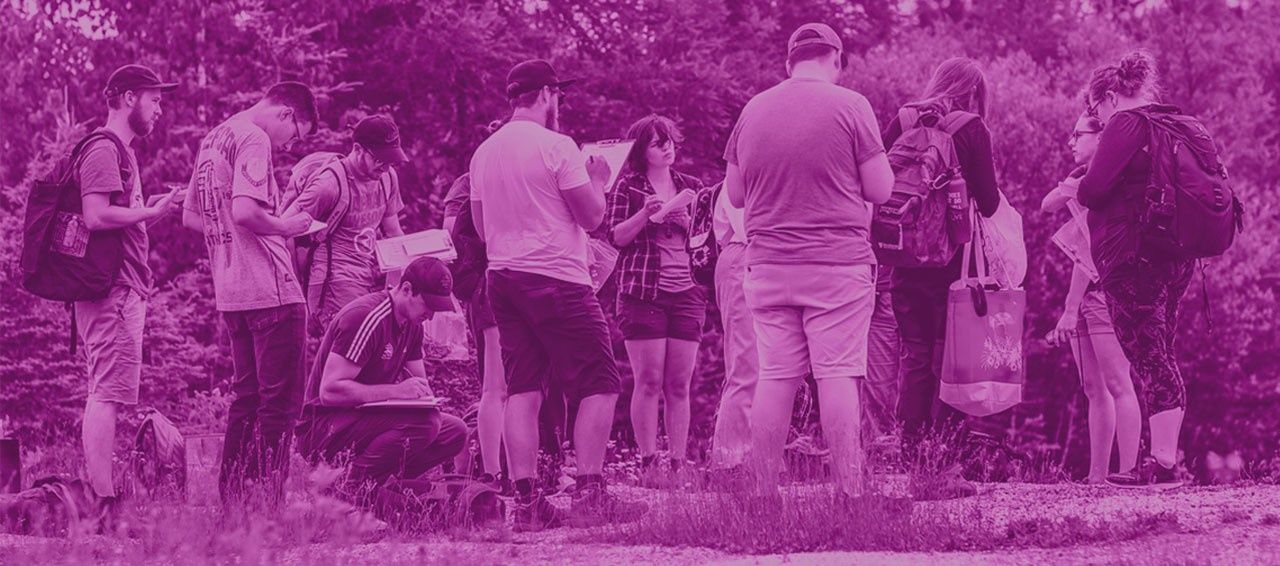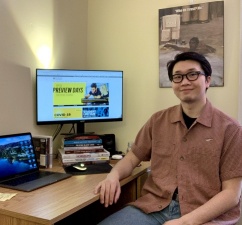Dinghui Zhu: Apprenticeship with Halifax Independent Film Fest
While double-majoring in Cinema and Media Studies and Social Anthropology, Dinghui Zhu completed a Film Studies Experiential Learning apprenticeship with the Halifax Independent Film Festival - an opportunity which led to a job as a programmer
Why did you chose to do a double major in Cinema & Media Studies and Social Anthropology? How did these two study areas complement or support your interests?
I only majored in Social Anthropology in my first two years at ����tv. During my second year, one of my friends introduced me to a film class taught by Dr. Shannon Brownlee. Dr. Brownlee is one of my favorite professors at Dal and she is also one of my role models. Under her influence, I gradually became more interested in film, and took more film classes.
Within the field of arts & social sciences, interdisciplinary studies has become a trend. I believe it would be beneficial to my career, either in the field of academic or in the job market. And most importantly, I am interested in both fields. So eventually I decided to do a double major in Cinema & Media Studies and Social Anthropology.
What I found in CMS and Social Anthropology is that they are both about people, which is what I am interested in. I grew up in a migrant community in Beijing in the 2000s. It was an energetic city that was just about to become more diverse and international. Because of this, I had the chance to meet all kinds of people with different backgrounds and learned to know how to adjust myself into different environments. This experience helped me to notice that there is not only one way to live a life, and seeing how other people live their life became more and more interesting to me.
Social Anthropology is a discipline about cultures. It attempts to understand cultures and societies from the perspective of ordinary people. When I was studying Social Anthropology, essays were the main medium. However, films and documentaries constantly appeared on the class material list of my Social Anthropology classes. Besides its aesthetic, I believe cinema has this kind of power that brings things to life. Being able to major in both fields helped me to not only understand different cultures, but also know how to properly express or introduce them in multiple ways.
Describe your involvement with the Halifax Independent Film Festival as part of your FSPA apprenticeship.
It was such a great opportunity working as an apprentice with the team. Because of COVID, I was first afraid it would be hard for me to find an opportunity for my apprenticeship. But thanks to Dr. Brownlee, she introduced me to Martha Cooley, the director at HIFF. I then prepared for the interview, and successfully got accepted as an apprentice at HIFF.
During my apprenticeship, my main role was going through all the submissions for the Canadian short program and roughly pick those shorts that might fit HIFF’s requirements. In addition to this, I also had the chance to be involved in the process of deciding the sequence of the films screening in the program. After that, I wrote a blurb for this program and checked the quality of all the submitted films for the festival. I also helped with shooting the videos for HIFF’s launch day. Overall, it’s been a great experience.
What drew you to do an apprenticeship with HIFF? Tell me about your experience working with HIFF once you completed your apprenticeship.
When I was thinking about doing an apprenticeship, I immediately thought about working for a film festival. As a Film Studies student, working for a film festival could be one of the perfect fields that allows me to apply what I learned from school. Dr. Brownlee suggested and helped me to contact several local film festivals. Eventually, I got accepted as an apprentice at HIFF.
����tv three months after I finished my apprenticeship with HIFF, they contacted me again and told me that they were looking for a new programmer to join their programming committee for the 2021 festival. Although I was busy with my honours thesis and my application for graduate schools, I still thought this was a great chance for me to gain more practical knowledge about films and the film industry. So, I tried my best to prepare for the interview, and I eventually became a programmer at HIFF.
Working for HIFF as a programmer instead of as an apprentice, I definitely felt the differences. There were more responsibilities, more research, and more film screenings. Compared to my apprenticeship, working as a programmer required me to not only do research for films but also construct opinions and discuss them within the committee. That’s ��the thing that I found most challenging, because I needed to share my understandings about a film with all the other programmers who are all super experienced. However, I soon adapted myself into the environment. It’s still an excellent experience to construct and share my thoughts about a film that might have just come out with all the other super experienced programmers who may have already worked in the field for years. It was such a pleasure!
What advice would you give to students considering completing apprenticeships or other experiential learning opportunities in the arts and social sciences?
The thing that I found most useful is to always try to do more research about things and not to be afraid to ask others for help.
What’s next for you?
I have been accepted to the graduate program at Nagoya University in Japan. I am going to continue my studies in cinema, this time focusing on eastern-Asian cinema. I am looking forward to moving to Japan. It is a beautiful country. I am really excited!
��
This interview took place in summer 2021

